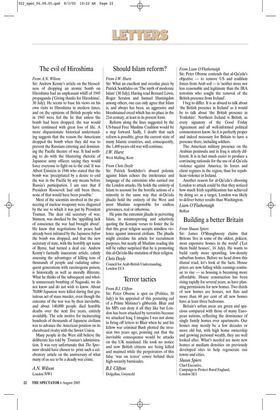The evil of Hiroshima
From A.N. Wilson Sir: Andrew Kenny’s article on the blessedness of dropping an atomic bomb on Hiroshima had an unpleasant whiff of 1945 propaganda (‘Giving thanks for Hiroshima’, 30 July). He seems to base his views on his own visits to Hiroshima in modern times, and on the opinions of British people who in 1945 were fed the lie that unless the bomb had been dropped, the war would have continued with great loss of life. A more dispassionate historical understanding suggests that the reason the Americans dropped the bomb when they did was to prevent the Russians entering and dominating the Pacific theatre of war. It had nothing to do with the blustering rhetoric of Japanese army officers saying they would force everyone to fight on to the end. It was Albert Einstein in 1946 who stated that the bomb was ‘precipitated by a desire to end the war in the Pacific by any means before Russia’s participation. I am sure that if President Roosevelt had still been there, none of that would have been possible.’ Most of the scientists involved in the pioneering of nuclear weaponry were disgusted by the use to which it was put by President Truman. The dear old secretary of war, Stimson, was shocked by the ‘appalling lack of conscience the war had brought about’. He knew that negotiations for peace had already been initiated by the Japanese before the bomb was dropped, and that the new secretary of state, with the horribly apt name of Byrne, had turned a deaf ear. Andrew Kenny’s factually inaccurate article, calmly assessing the advantages of killing tens of thousands of people and radiating subsequent generations with carcinogenic poison, is historically as well as morally illiterate. What he thinks of the subsequent and wholly unnecessary bombing of Nagasaki, we do not know and do not wish to know. About 70,000 Japanese were killed during that gratuitous act of mass murder, even though the outcome of the war was by then inevitable, and about 140,000 people died horrible deaths over the next five years, entirely avoidably. The sole motive for incinerating hundreds of thousands of Japanese civilians was to advance the American position on its chessboard rivalry with the Soviet Union.
Many people in the West still believe the deliberate lies told by Truman’s administration. It was very unfortunate that The Spectator should have chosen to print such a celebratory article on the anniversary of what many of us see to be a deadly war crime.
A.N. Wilson
London NW1











































 Previous page
Previous page